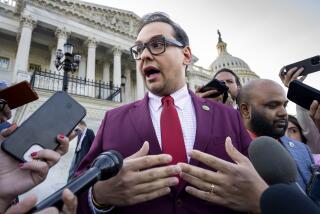A Void in Gifts Law
- Share via
One of the most difficult jobs for a state or federal prosecutor is convincing a court that a person or group tried to influence government action through gifts. The 1962 federal Illegal Gratuities Act prohibits giving something to a federal official “for or because of any official act performed or about to be performed.” It was under this law that independent counsel Donald C. Smaltz charged the Sun-Diamond Growers of California, alleging that it gave gifts worth $33,000 to then-Agriculture Secretary Mike Espy because of his “official position.” They included tennis tournament tickets, luggage and meals.
It was no great surprise that the U.S. Supreme Court, by a 9-0 vote Tuesday, overturned the conviction of the Pleasanton-based raisin and nut cooperative. Speaking for the court, Justice Antonin Scalia said the government failed to prove an actual link between the gifts and some action or prospective act on the part of the onetime Agriculture secretary. In other words, there was no evidence of a quid pro quo. Just currying favor with Espy was not enough, he said.
The ruling does not affect state laws that severely restrict gift giving or regulations that bar members of Congress and federal officials from accepting money or expensive gifts. But it does make it more difficult to control the largess of Washington lobbyists and special-interest groups.
This was a second blow to Smaltz and his four-year, $20-million probe of Espy. Espy himself was acquitted by a jury in Washington in December of all charges involving the gifts. Jurors said the prosecutor failed to make the link between the gifts and any action on Espy’s part. Earlier, Smaltz had won a criminal conviction and a $1.5-million fine against Sun-Diamond.
Congress should fill the void created by the court ruling. It is naive to believe that corporations or other special interests give money or expensive gifts to high government officials or legislators for the pure nobility of it. They expect something, although that need not be a specific act such as securing a favorable amendment or regulation change. Currying favor via valuable gifts might not be illegal under the 1962 law but it should be made officially out of bounds.
More to Read
Sign up for Essential California
The most important California stories and recommendations in your inbox every morning.
You may occasionally receive promotional content from the Los Angeles Times.













